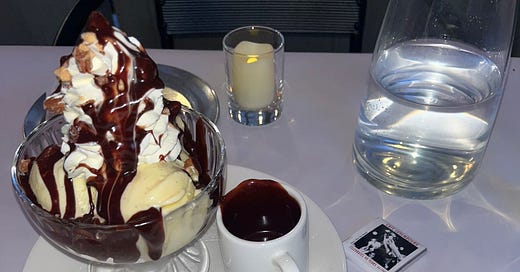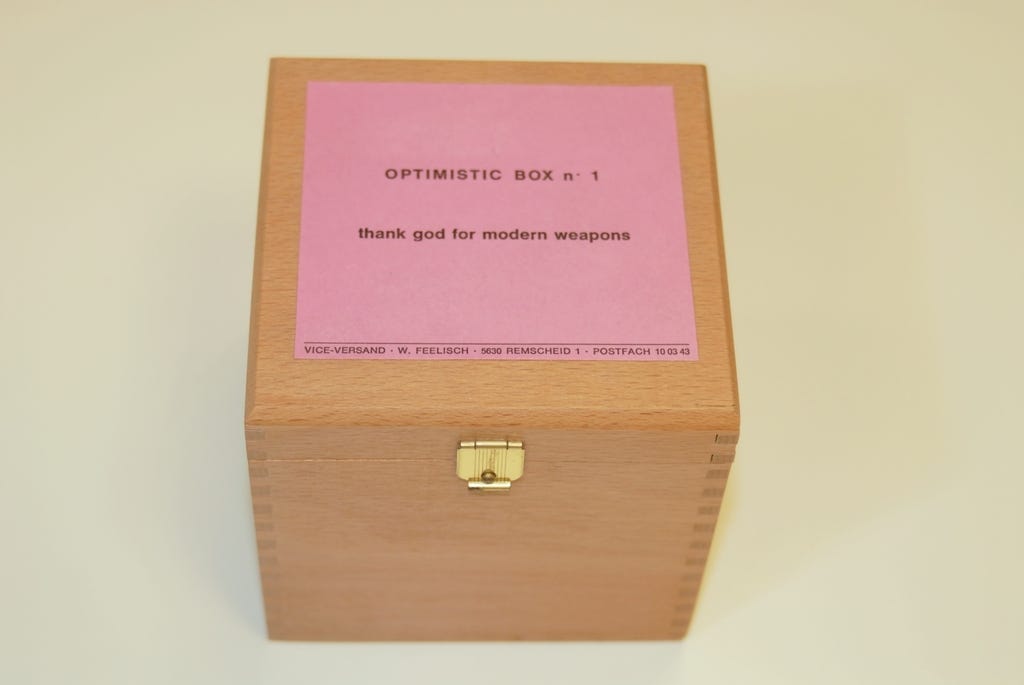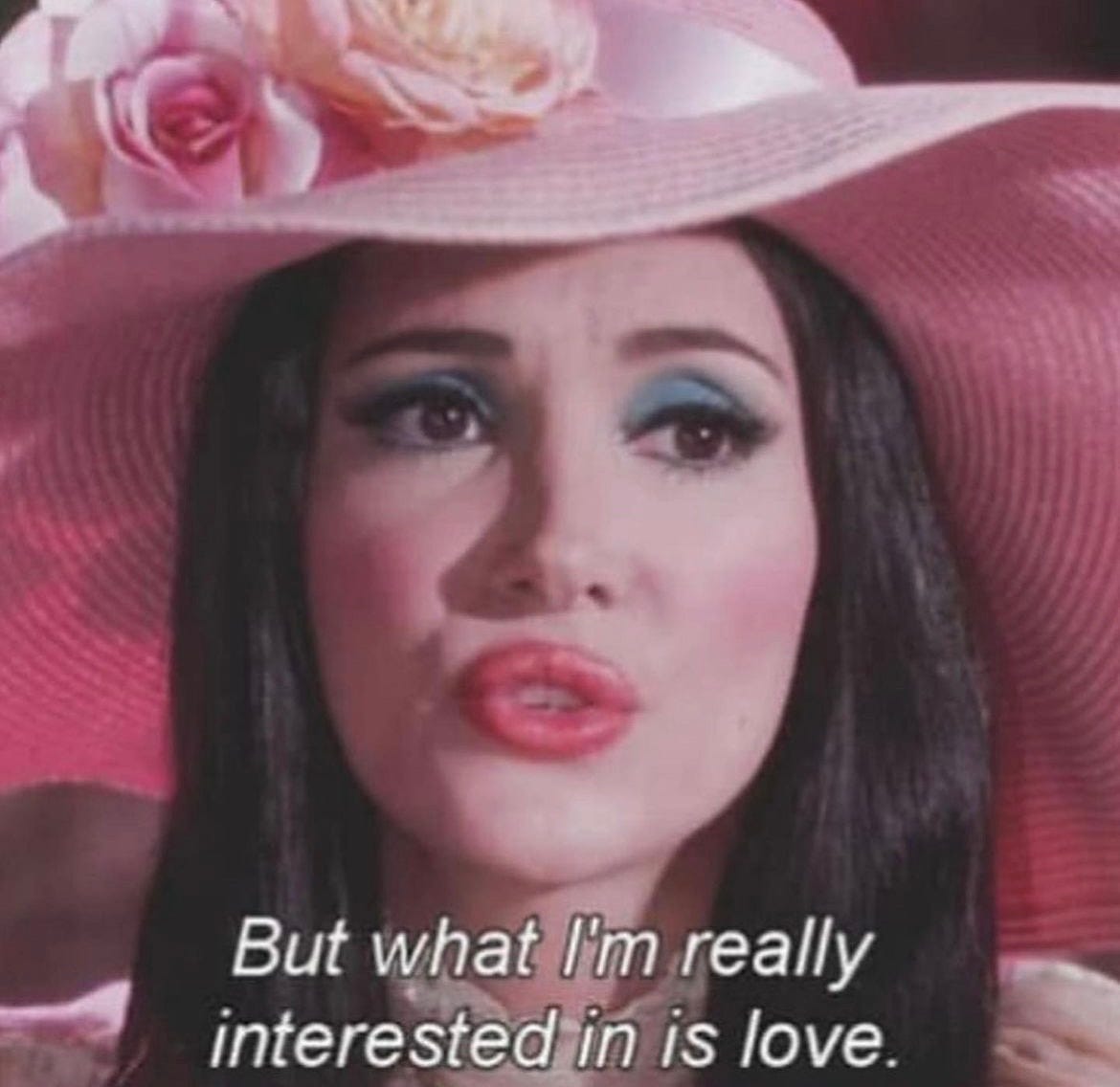“Is there anything specific you’re looking for?” the shopkeeper at Lara Koleji asks.
“Just pleasure,” a woman responds.
I tell Ani I haven’t been writing because I’m in love. I have no thoughts, I complain. Ani confesses she’s also been feeling manic and struggling with her fiction series, having spent her weekend making Gisele Bundchen’s viral Instagram chocolate instead which turned out “really good”. We’re drinking grüner at Cafe Katja to kill some time before Nicolette Polek’s reading at EARTH.
I read an excerpt from Nicolette’s novel, Bitter Water Opera, while wading through my monthly Harper’s subscription at Cafe Luxembourg. I was early for a show at the Beacon Theatre, so I’d stopped in for a Harry’s Super Sundae. Three large scoops of vanilla ice cream. Praline almond sauce. Topped with whipped cream. I wish someone had seen my face when the waiter arrived with that giant sundae; when I glanced over at the couple next to me I noticed my neighbors frantically leaving their tables instead. Within seconds, the canopy tent (I was seated outside) began to blow off. There I was, sitting on a sidewalk in the middle of a 60 mph wind storm, grinning like a little kid with a mountain of ice cream while chaos ensued around her.
The picture of that vivid memory equally sums up how I’ve felt these past few weeks—sugar-high off sweet, new romance—however infantile I may seem in my ignorant state of bliss amid a bleak, bleak world.
That was the third time I’d recently been caught in bad weather, next to the night I’d trekked through a flash storm in my red Miu Miu pumps to see Carmen despite a clear weather advisory. It didn’t matter. Nothing could hurt me in my red Miu Miu heels. Like Dorothy in The Wizard of Oz. Three clicks and I could go anywhere. On the evening of my birthday dinner at The Leopard, two earthquakes shook up the Tri-State area. Dress for the occasion you want (high drama, that is), and you’ll get it.
Ani takes out her phone and on the back reads: AMOR FATI.
In Norse mythology, fate is a central theme where man’s destiny is usually tied to wise, supernatural women. Christian Dior, who coined “the cocktail dress”, was a follower of the occult and mystic arts. Before Dior was a fashion designer, his parents hoped he’d someday be a diplomat, though his discipline cultivated more or less the same savoir-faire as politics. Dior knew that anyone could acquire personal power, as long as they were dressed well. A good cocktail dress is witchcraft. A divination tool for an alternative future. An anticipatory receptacle for something else. Grace is a feminine measure against the masculine forces of destruction. To welcome, even love, your fate.
Robert Filliou - Optimistic Box No. 3 (1969)The "optimistic box" contains nothing—a whimsical commentary on the human tendency to seek positivity and meaning in unexpected places.
I read the back of Ani’s phone again. We talk about how it’s harder to remember certain moments. I almost added “as we get older”, but neither of us is that old. I point to her phone, exclaiming that this is where all our memory is stored now. We discuss how remembering and knowing too much is to the same extent just as burdensome as chronically forgetting. I tell her I’ll write about this day, so we don’t have to forget.
Rebecca Solnit often quotes the theologian Walter Brueggeman on memory, who said it produces hope in the same way that amnesia produces despair. To hope is to embrace the unknown. When I found myself accidentally pregnant three summers ago, it was the first time I seriously considered what it would mean to become a parent, and how that default thinking suddenly sets you apart from so many others. Most cynics (I mean truly nihilists) are usually childless. When you’re responsible for someone else’s life, it’s instinctual to go on hoping and living and believing in the future even in the face of uncertainty. These days, producing life, or simply falling in love again, means putting faith in humanity, however foolish we deem it.
I’ve always loved this Harper's Bazaar essay “In Defense of Romance” by Marlowe Granados, where she talks about Rebecca Solnit’s book Orwell’s Roses and the contradictory lens on the politics of pleasure:
“Solnit writes, ‘The left has never been short on people arguing that it is callous and immoral to enjoy oneself while others suffer. […] Underlying all this is a utilitarian ideology in which pleasures and beauties are counterrevolutionary, bourgeois, decadent, indulgent, and the desire for them should be weeded out and scorned.’
Solnit writes of political slogan “Bread and Roses,” as the latter ‘in these declarations stood for the way that human beings are complex, desires are irreducible, that what sustains us is often subtle and elusive.’ Being brushed by the fortifying stroke of romance—in all its different forms—is just what the world needs.”
To be a romantic is to be hopeful, much like the way Melissa Broder once talked about longing: Longing is sexy, full of devastation and hope. Because it means you want a future and something to live for, to move towards like this isn’t it. Everything isn’t over. The Nordic version of the apocalypse, aka the tale of Ragnarok, prophesied a coming fate that’d one day bring destruction to the cosmos and all that’s in it—including the gods. It’s said that two humans, a man and a woman named Lif (Life) and Lifthrasir (after Life) would be the only two survivors, emerging from a tree to populate a new world. Even the Vikings, who were caricatures of hegemonic masculinity, believed in shit like hope and love at the end of oblivion, I guess.
The Love Witch (2016) directed by Anna BillerAni and I arrive at the reading at EARTH, where Walt John Pearce is reciting a love poem, one about memory. Aren’t all love poems about memory, anyway? I think to myself. Memory and longing, using people as landscapes. I stand there, thinking about love and war, and how to be in love is to be in a perpetual state of distraction, and, god, this is what Sally Rooney meant in Beautiful World, Where Are You? when she said we simply loved each other too much and found each other too interesting while there were more important things we should’ve been doing—and if that means the human species is going to die out, wouldn’t that be a nice reason—because we’re simply too stupid about each other? Nicolette reads from her book wearing a sleek navy cocktail dress. After it’s over we go outside for some fresh air, and I overhear two male writers discussing “e-boys and e-girls” and something about Lauren Oyler.
How come guys our age just want to talk about literary Twitter drama, I protest. What happened to, I don’t know, science?
“They’re all effeminate now,” Ani jokes. “They think they’re engaging in cultural criticism, but it’s just gossip.”
I run into Cristine. “I’m in love!” I declare to her.
Does he love you back? She asks, in a motherly way.
Yes, I exclaim, feeling slightly embarrassed.
Ani and I make our way to another reading, when—unexpectedly—it starts to rain.






